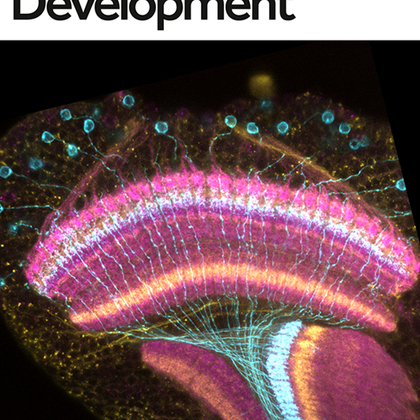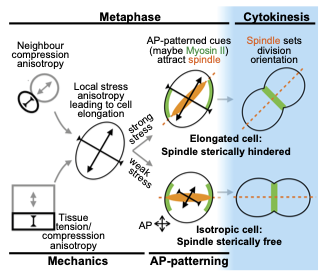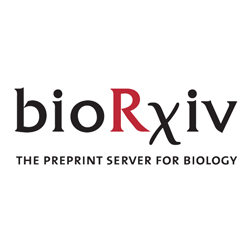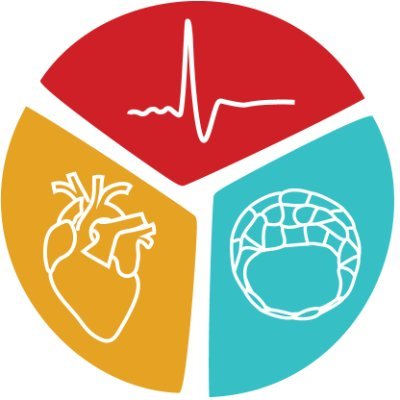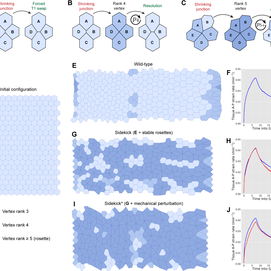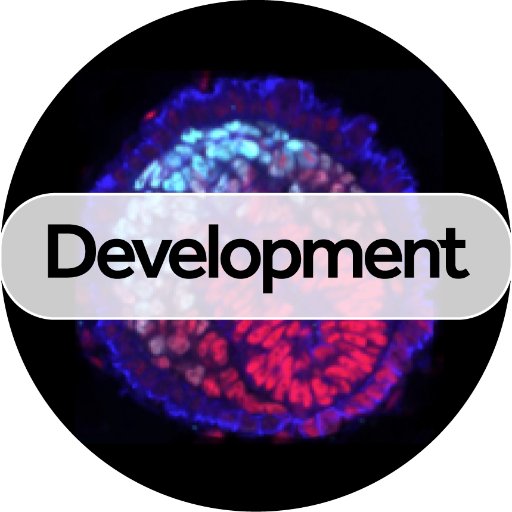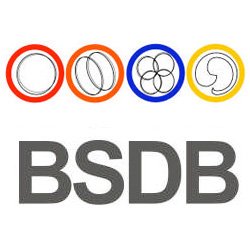
Sanson Lab
@SansonLab
Followers
572
Following
36
Media
3
Statuses
32
Bénédicte Sanson's lab @PDN_Cambridge @Cambridge_Uni investigates morphogenesis in Drosophila.
Cambridge, England
Joined August 2018
Congratulations @GuyBlanchard5 and @ElenaScarpa4 for having their work featured as Biomedical Picture of the day @BPoD_s ! To find out more about the video, have a look at this paper
journals.biologists.com
Summary: This work demonstrates that patterning and stress cues, both tensile and compressive, are integrated at metaphase to direct the spindle orientation and thus the orientation of cell division.
Quantitative analysis of 100s of #epithelialcell divisions reveals stresses & forces influencing #celldivision orientation in developing #drosophila embryo. Video & research by @GuyBlanchard5, @ElenaScarpa4 et al @SansonLab @PDN_Cambridge @Dev_journal. On https://t.co/qWqxpcDiZy
0
3
11
Our cell division orientation paper is out!
Our paper on how mechanics and patterning combine at metaphase to orient planar epithelial divisions in vivo just out in Development, with @ElenaScarpa4, Leila Muresan, @SansonLab, @PDN_Cambridge. Thread digest follows… 1/5 https://t.co/74SO9U59DJ
0
0
12
Morphogenetic movements can generate forces that pull on adjacent tissues and change cell behaviours through mechanics and mechanotransduction, but does this always happen? We find that #Drosophila germband extension is remarkably robust to mesoderm invagination. #morphogenesis
Computational analysis of gastrulating #Drosophila embryos by @SansonLab shows that polarized cell intercalation is robust to the force generated by #mesoderm invagination, though this slows down the rate of A-P cell elongation @PDN_Cambridge #PLOSBiology
https://t.co/cuDoDkgvKn
0
8
14
Our latest paper on mechanical boundaries and the role of Tartan is out in @Dev_journal
https://t.co/SYiPz2Jxqh
1
13
40
Check out our new preprint ‘Different temporal requirements for the LRR transmembrane receptors Tartan and Toll-2 in the formation of contractile interfaces at compartmental boundaries’ https://t.co/Wsym01XpLY
@PDN_Cambridge
@Cambridge_Uni
biorxiv.org
Compartmental boundaries physically separate groups of epithelial cells, a property fundamental for the organization of the body plan in both insects and vertebrates. In many examples, this physical...
0
4
23
An opportunity to join our lab! We are currently advertising a research position, in collaboration with @StJohnstonLab and @LabBuckley. For more info see https://t.co/8yxeyiCWPs. Please share & RT @PDN_Cambridge @Cambridge_Uni
0
20
18
We have another summer student starting this week. Welcome Florrie Clark! We hope that both you and Bridget enjoy working with us and learn lots @PDN_Cambridge
0
0
4
We are lucky to welcome Bridget Ryan, a summer student, to the lab this week. And congratulations Bridget on your Gurdon/The Company of Biologists Summer Studentship! ( https://t.co/LeDtALy9rV)
@PDN_Cambridge @_BSDB_
0
0
9
We are looking for a new postdoc to study the composition and role of tricellular adherens junctions in epithelial morphogenesis. In collaboration with @StJohnstonLab and @LabBuckley. For more info see https://t.co/AAMvDC34A7. Please share & RT. @PDN_Cambridge (@Cambridge_Uni)
1
29
36
Well done Alex Nestor-Bergmann for winning a poster presentation prize at the ‘EMBO: Physics of Living Systems workshop’ last week! @PDN_Cambridge
0
1
4
Preprint available online now! The team's latest work on how adhesion dynamics regulate cell intercalation behaviour with Alex Nestor-Bergmann @GuyBlanchard5 @Nathan_Hervieux @AlexGFletcher @JoscelynEtienne @PDN_Cambridge
biorxiv.org
Cell intercalation is a key cell behaviour of morphogenesis and wound healing, where local cell neighbour exchanges can cause dramatic tissue deformations such as body axis extension. Here, we...
0
8
16
Bénédicte and @TomSharrock's review on cell sorting and morphogenesis in early Drosophila embryos is now live! -> https://t.co/ZbAIXf3c96. The review covers mechanisms of cell sorting, accompanying cell behaviours, and also features a very beautiful in situ HCR by @ErikClark01
0
13
18
Bénédicte spoke to @amjeve from @the_Node this morning as part of the #BSDBGenSoc2020 e-meeting. A quick Q+A session highlighting the lab's current work.
0
1
9
The Sanson lab is offering 2 PhD projects, beginning in October 2020, under the new @WolfsonCollege & @PDN_Cambridge joint studentship. For more information -> https://t.co/UyQiZARxvd or contact us directly. Please share & RT.
0
6
8
Online now! The team's latest study on the tricellular adhesion protein Sidekick. @Nathan_Hervieux @TaraFinegan @GuyBlanchard5 @AlexGFletcher @PDN_Cambridge
https://t.co/gPDcpqc4wb
journals.plos.org
This study identifies the adhesion molecule Sidekick as a resident protein of tricellular vertices between cells, at the level of adherens junctions. A combination of quantitative methods and...
0
17
35
Read about Benedicte’s research journey here!
Benedicte Sanson @SansonLab of @PDN_Cambridge @Cambridge_Uni won the Cheryll Tickle medal for outstanding mid-career female #devbio researchers. We talked about her phage-to-fly transition and how collaboration & interdisciplinarity drive her science 3/3 https://t.co/f24QICJCLX
0
3
15
Latest pre-print from the lab is now available on #bioRxiv - "The tricellular vertex-specific adhesion molecule Sidekick facilitates polarised cell intercalation during Drosophila axis extension"
Pleased to see this on biorxiv! Research by @SansonLab led by @TaraFinegan and Nathan Hervieux, with @GuyBlanchard5, me and (den enestående) Alex Nestor-Bergmann
0
9
15
Our paper is now online ! #vertex #morphogenesis #Drosophila The tricellular vertex-specific adhesion molecule Sidekick facilitates polarised cell intercalation during Drosophila axis extension
biorxiv.org
In epithelia, tricellular vertices are emerging as important sites for the regulation of epithelial integrity and function. Compared to bicellular contacts, however, much less knowledge is available....
1
3
6
Post-doc Nathan Hervieux (poster 150) and PhD student @TomSharrock (poster 156) will be sharing current work during this evenings poster session at #EESMechanical
0
3
6
Great news today for the lab!
We are very pleased to announce that the 2019 Winner of the Cheryll Tickle Medal is Bénédicte Sanson! Look out for her interview on the Node soon https://t.co/OqWzEeQuij
@SansonLab @PDN_Cambridge
4
2
21

